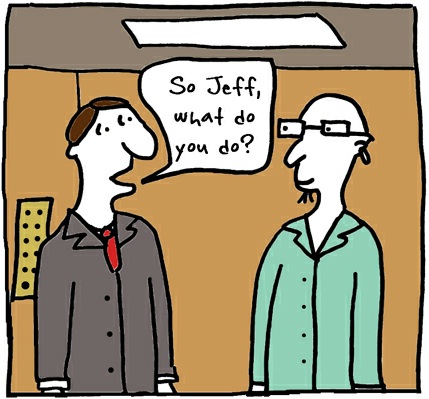So… What Do You Do?
Hello from mushy Sacramento, CA. Flying in this afternoon the whole area looked like a big sponge, everything looked flooded out, and its still raining. And I thought there was a severe drought here…
**********************************************
Most people have heard this question before… “What do you do?” Usually the person asking is wanting to know your job title or occupation.
If you are a trucker or a chef the answer might be fairly simple, but in technical fields the answer can be more complex. People are familiar with food and 18 wheelers, but if you say you’re a controls engineer, PLC programmer or panel builder people may look at you with a blank stare. My wife has built industrial control panels for about 20 years now, and it can be pretty complicated to explain her job to her woman friends who have never been in a factory.
When I was building custom machinery and doing a lot of PLC programming I often had the same problem, even with guys. There are a lot of buzzwords and acronyms involved in the explanation, it can be pretty confusing for people not familiar with industry.
If you are involved in any entrepreneurial activity, you are probably familiar with the idea of an “elevator pitch”. The premise is that you meet some person you need to impress in an elevator and only have 30 seconds or so to let them know your big idea, or why they might want to hire you. Conventional wisdom is that its a bad idea to just state your job title or recite your resume. Instead, some people advise describing what you do in terms of the problems you can solve for that person. Maybe describing the services you offer or listing some of your credentials would be part of that also. You might even follow up with how you got where you are.
One suggestion I recently read advises that you condense your idea or description of what you do even more. Twitter only allows messages of 140 characters or less; this can be quite challenging. In “Talk like TED” by Carmine Gallo, he suggests condensing what you do into a “Twitter Friendly” headline. He says that this can be an excellent exercise even if you aren’t pitching an idea or looking for a job. It tends to provide clarity to your thoughts.
I took this advice and decided to try and define my “mission statement” or what I do into a Twitter friendly phrase. What I came up with is the following:
“Helping People Understand All Aspects of Automation”
This came out to a very condensed 51 characters. I then elaborated on each concept to ensure this is really what I meant and came up with the following:
Helping: No one can “make” someone learn. The person needs to have the desire, all I can really do is help.
People: Male or female, all races, backgrounds and beliefs, all educational levels. Yup, this is pretty much what I meant.
Understand: This means not only learning how to repeat or memorize, but to truly be able to draw ones own conclusions and create original thoughts.
All: This is very broad. Obviously I can’t include everything, but it does imply needing to think outside of the confines of the technology.
Aspects: May include societal impacts, psychology, education, financial concerns, required knowledgebase, safety and employment.
Automation: Includes Industrial (machines and processes), robotics, sensing, circuits/components/microprocessors, home automation, building automation (commercial and industrial facilities), mechanical, electrical, pneumatic & hydraulic, software, IOT (Internet Of Things), communications and computers.
Right now I spend a lot of my time teaching for Automation Training in a fairly narrow part of this field, primarily PLCs, HMIs and SCADA. But the book I wrote several years ago covered a lot of subjects (though very shallowly); I still find myself visiting a lot of these concepts when teaching. I get people from manufacturing, process control, teachers in universities, laboratory types and students right out of school. Some people want to learn to program, and others want to concentrate on troubleshooting and maintenance. Long term, I think this statement really does reflect what I hope to accomplish.
This was a pretty effective exercise for me, plus it made the time flying today go by pretty quickly. I would encourage anyone to try it out, you might find it challenging to condense what you do even more than an elevator pitch does.
So… What do you Do?

